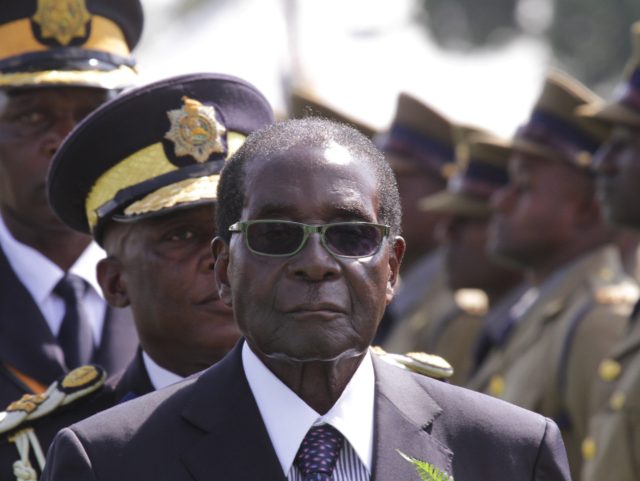State Department spokeswoman Heather Nauert confirmed on Tuesday that the United States provided Zimbabwe with $220 million in aid in 2016 alone, citing “democratic governance” as one of the areas the U.S. has funded.
America has also provided significant food and health aid to the impoverished country, Nauert added. She did not provide details on these programs.
Nauert provided the fact in response to a question on whether Washington would change its relationship with Zimbabwe since the announcement that its longtime dictator, Robert Mugabe, had agreed to resign. The nation’s military intervened last week and placed the 93-year-old under house arrest, insisting that their call to remove his wife, Grace, as successor was not a coup d’etat.
Nauert stated that she was “not aware” of plans to change the U.S.-Zimbabwe relationship. “I can tell you that last year we provide $220 million or thereabouts in assistance to Zimbabwe,” she said. “That was for their health systems, food, nutrition, democratic governance, and others. I’m not sure if that number – or if that will change, but we’re certainly looking forward to the future for Zimbabwe.”
Nauert also addressed Mugabe’s resignation directly, calling it “a historic opportunity and historic moment for the people of Zimbabwe.”
“We look forward to and hope for free and fair elections. What they will do in the meantime is what we hope. We continue to urge unwavering respect for the rule of law and for established democratic practices,” she added.
Zimbabwe has been a dictatorship for the entirety of its existence, ruled by the same genocidal strongman between 1980 to Tuesday. As prime minister in the 1980s, Mugabe led the charge on a mission called “Operation Gukurahundi,” targeting and systematically executing people of the Ndebele ethnic group, who were more likely to support the opposition Zapu party. Documents revealed decades later that Mugabe was aware of and aided the massacre of more than 20,000 Ndebele people. He remained president long after the operation concluded.
The specifics of America’s “democratic governance” aid in Zimbabwe are not clear. U.S. Agency for International Development (USAID), on its Zimbabwe page, notes that America has spent $2.6 billion in the past 30 years on programs in Zimbabwe. Many involve help for HIV/AIDS patients and campaigns to help reduce instances of malaria and other infectious diseases. USAID claims it also “promotes democratic governance by supporting Zimbabwean efforts to improve government accountability and responsiveness to citizens’ needs.”
Other USAID programs include “gender equality and empowerment” efforts and food security campaigns.
Under Mugabe, the Zimbabwean economy has nearly completely collapsed and its agricultural center dwindled in production dramatically, causing mass food shortages and necessitating the printing of a 100-trillion Zimbabwean dollar note.
While USAID has provided aid, the State Department and the Treasury have sanctioned certain sectors of the government for its repeated violations of human rights. Beginning in 2001, according to State:
The United States began imposing restrictions on U.S. support for multilateral financing, followed by financial sanctions against selected individuals and entities, travel sanctions against selected individuals, a ban on transfers of defense items and services, and a suspension of non-humanitarian government-to-government assistance.
Aid continued to enter the country, and with it, reports that the government in Harare was stealing it. In 2008, for example, the New York Times reported a mass confiscation of 20 tons of food aid intended for poor schoolchildren. Mugabe handed out the food to his supporters as a gesture of loyalty, instead. The government then suspended all humanitarian aid, arguing that outside groups were trying to win public favor for Mugabe’s opposition.
Last year, New Zimbabwe reported that the U.S. embassy in Harare had begun another investigation into the disappearance of American food aid based on more reports that Mugabe’s government was stealing it and “politicizing” the donations.
Local reports in Zimbabwe speculated that, with the election of President Donald Trump, the nation might stop receiving as much aid as it had in the past few decades. Zimbabwe’s the Standard noted that Trump had proposed dramatic cuts to the State Department and USAID budgets in April.
The Zimbabwean military intervened in the government last week, placing Mugabe under house arrest. After refusing to step down during the weekend, Mugabe finally tendered his official resignation on Tuesday.

COMMENTS
Please let us know if you're having issues with commenting.